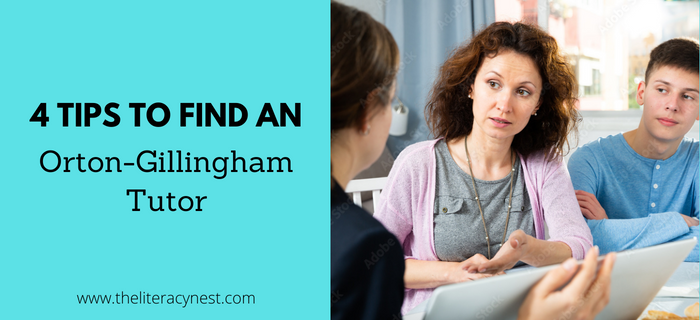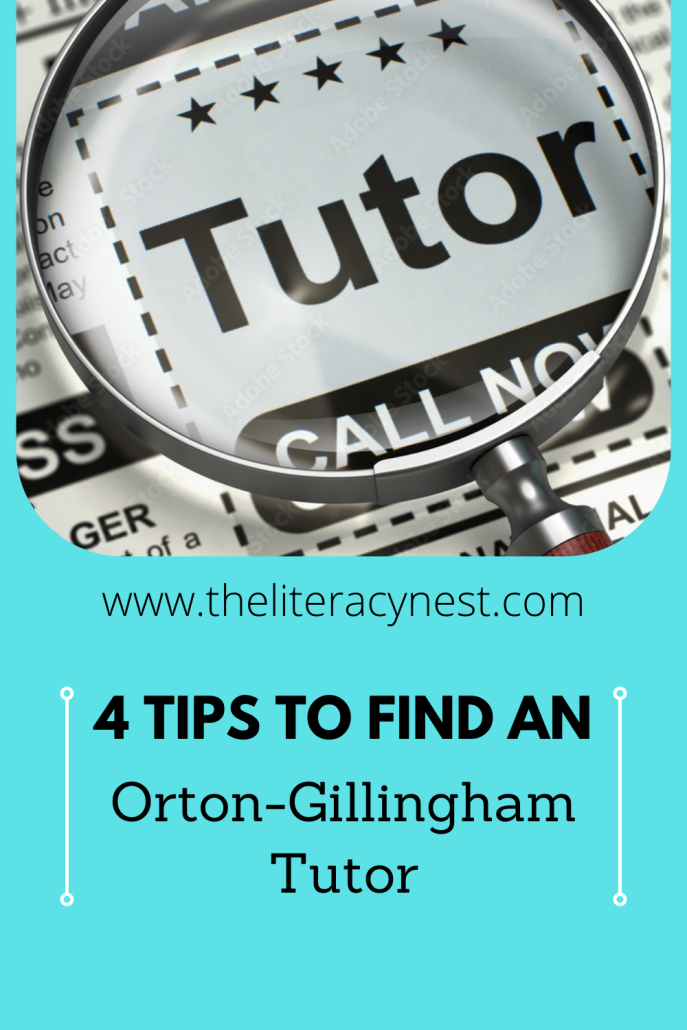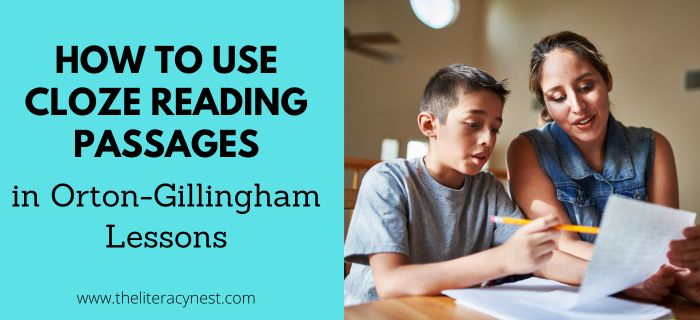4 Tips to Find an Orton-Gillingham Tutor

When your child is struggling to learn to read or has recently been diagnosed with dyslexia, it can be overwhelming. Where do you start to find help? How do you protect your child who seems so beaten down by their school experiences? You realize you need help, but what kind of help should you look for? How can you most easily find an Orton-Gillingham tutor?
An Orton-Gillingham tutor is a person that is trained to administer instruction that is specially designed for learners with dyslexia. They are knowledgeable about phonics, phonemic awareness, and morphology and are prepared to teach in a way that is systematic, multisensory, proscriptive, and diagnostic.
If you want to learn more about the Orton-Gillingham approach, check out: How to Explain Orton-Gillingham to Families
These lessons are customized for your child and taught either individually or in small groups. Sometimes an Orton Gillingham tutor may be an employee of your local school district, but more frequently, this person is in private practice or part of a learning center.
Below, I’ll share the most important things to consider to find an Orton-Gillingham tutor that will best serve your family:
1. Where to look:
So, you have a sense of what you are looking for, but how do you find an Orton-Gillingham tutor? You may find tutor listings as part of directories through organizations such as the International Dyslexia Association, Orton-Gillingham Academy, Decoding Dyslexia, or Learning Ally.
Your local school may have recommendations for someone with the skill set you are looking for. Talk to the parents of other children who have had difficulty learning to read. Benefit from what they have learned and in turn share your knowledge and advice going forward.
Too often, dyslexia has been kept quiet as if it were a shameful secret instead of being talked about in the open and sharing resources and knowledge. As a tutor, most of my students come because of referrals from current or past students. Word of mouth is a powerful force for spreading dyslexia-savvy practices.
Don’t forget to educate and empower yourself, too. Check out The Top Ten Books About Dyslexia for Parents and Teachers.
2. What to look for:
There are several different accrediting organizations, but an ideal Orton Gillingham tutor is going to not only be trained but also certified to teach Orton Gillingham or an OG-based program. You may choose to work with someone that has a teaching degree but may want to consider someone with additional education such as a reading specialist or special education degree.
Some of the most common certifying organizations you might see are a CALP or CALT (Certified Academic Language Practitioner or Therapist through ALTA), certification through CERI either CDP/CDT or SLDI/SLDS (Certified Dyslexia Practitioner or Therapist or Structured Language Dyslexia Interventionist or Specialist).
Another common way people get trained and certified is through OGA (Orton Gillingham Academy). You may encounter an OGA Associate. These trainings and certifications are all intensive and prepare teachers well for providing tutoring to students with dyslexia.
The popularity and availability of different trainings and certification titles vary regionally. Your ideal OG tutor will have completed a training program at least several months in duration and have completed a supervised practicum.
3. How to Reach Out:
Depending on how you locate a potential tutor, you may have a phone number, website, or email address. Personally, I am most often contacted via email and set up a consultation either via phone or in person.
Some things you may want to share upfront include your child’s age, grade, diagnosis if they have one, and goals for tutoring.
In general, Orton Gillingham tutoring is not a short-term arrangement, but something ongoing, lasting a year or more. If you are looking for something different, it is helpful for your potential tutor if you share that information ahead of time.
What is the Orton-Gillingham Approach? A Free Pamphlet for Educators and Families.
4. Things to ask:
I’m sure you have lots of questions in mind to ask your potential tutor, but here are some important ones to add to your list.
- Be sure to ask about tutoring location and rate.
- Some tutors have an office location while others may meet at public libraries or even come to your home.
- Hourly rates vary widely by location.
- You may wish to ask about any materials or programs that are used and if there is a materials fee. (Want to learn more about tools and accommodations? Listen to our All About Accommodations for Dyslexia episode of Together in Literacy.)
- It is helpful to ask about a tutor’s training and experience, particularly if the training organization is one less familiar to you.
- Be prepared to talk about concerns you have about your child’s reading and writing, what your goals are for tutoring and why you decided to seek help.
- It is helpful to know about co-occurring conditions such as ADHD to best match tutor skills with student needs.
Some of the most important information may be about your child’s attitudes and emotions around learning to read.
Additional Helpful Information
Many tutors like to begin with some sort of initial assessment to determine the best place to start with each child, this process can be enhanced and assisted by sharing any additional information such as special education testing, outside testing, progress reports, copies of IEP documents or RTI individual learning plans. When this information is available, I frequently adjust my assessment plans accordingly either removing assessments that duplicate information or adding tests to look at data that may not be included. It is also helpful to let the tutor know about any other important information such as special medical needs, allergies, etc.
Sometimes everything clicks nicely into place, and you match right away with a tutor that is a great fit. Other times, you may encounter waiting lists or require multiple attempts before finding a good fit for your family and your situation.
Keep a paper trail and take notes. If a tutor has a waiting list, check in periodically to let the tutor know you are still interested. Sometimes you may be talking to several tutors trying to find the best schedule for your family. If you do find another tutor, it is helpful to let a tutor you’ve been consulting with know.
If you have questions about rates or location, open communication is always the best policy. And, if they are holding open a spot in their caseload for you, they may turn someone else away. Also, we want you and your child to be successful whether with us or a different tutor.
Did you know… the Literacy Nest connects parents to private Orton-Gillingham tutors?
Using the Tutor Finder Directory, parents can search a database of OG-trained tutors by location. Then, view each tutor’s profile to find their rates, availability, experience, education, certifications, and contact info!
Looking for a virtual Orton-Gillingham tutor? Tutor Finder has a search filter to help you find either in-person or online educators.
Find an Orton-Gillingham tutor today with the
Orton-Gillingham Tutor Directory!






